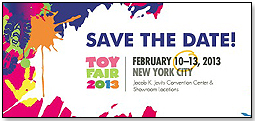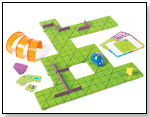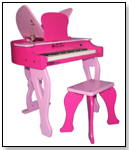|
|
2013 Toy Fair – a Review by Lutz Muller This year’s Toy Fair was again a resounding success. More than 33,000 visitors crowded approximately 1000 showrooms – about a quarter of which were there for the first time. According to one buyer, traffic was up at least 10% compared to last year.  The good news was that all the buyers I spoke to came away from the place with a very firm idea of what products and what companies they were going to back. After all, they had traveled afar and spent an inordinate amount of time putting together what was going to populate their shelves over the next nine or so months. In short, there was nothing that upset preconceived opinions. And this is also the bad news. Yes, there were differences if you compared things with Toy Fair a year ago but these were marginal. More SKUs, more colors, higher prices, and many more new vendors most of whom closed down their display at the end of the Fair without having much to show for the time, effort and money spent on it. And most manufacturers and most retailers held firmly to their decade-old mantra “play it safe, keep it cheap”. We know that 2012 was a flat year for toys, as was the year before that and the year before that as well. We also know that some companies did fantastically well last year – Lego, MGA Entertainment, Playmobil, Leap Frog, Activision – and most others did poorly. According to the buyers I spoke to, the difference is simply in innovation. The classic example is Activision’s Skylanders. New, uncompromising, totally novel in approach and not bargain basement Having said all this, I did ask the buyers what they perceived as the differences and the innovative highlights during their four days at the show. They were a little challenged at coming up with responses but this is what they finally said were the new and novel features of what they had seen: New Emplasis on Girls At the end of 2011 Lego introduced a range specifically targeted at girls, "Lego Friends," and put it into the Girls area of the toy department next to Littlest Petshop. It was a runaway success and we now find that other manufacturers have determined that girls could represent a novel consumer group for certain traditionally “boy” toy categories. Specifically, Hasbro has introduced a Girl range for Nerf – “Rebelle”, Mega Brands a construction range under the Barbie brand and Educational Insights a range of telescopes for girls called “Moonscope.” We also notice that a number of new toy ranges traditionally totally focused on boys now are much more uni-sex – KidKraft’s Fire Rescue Station and Step2’s Play Kitchen are cases in point. Equally, girl-specific toys are becoming more unisex. Hasbro’s Easy-Bake Oven is a case in point. It used to be that you could have the product in any color you wanted provided that it was pink or purple. The company has now agreed to offer other colors as well. Strong Emphasis on movies Movies have traditionally been a major driver of toys but 2013 promises to be a particularly strong year. Last year there were twelve movies that were toy specific and this year there will be fifteen. In both years, Mattel and Hasbro were the master licensees for the majority of these movies – in 2012 5 and 4, in 2013 both 5. In addition, Mattel is the master licensee for three TV serials associated with toys – Scaris City of Freights (Monster Fashion Dolls), Max Steel (Action Figures) and Planes (Preschool – similar to CARS). Not only were products from the Master licensees (Mattel and Hasbro) very conspicuous in their respective showrooms, all their sub-licensees equally showed products. In our opinion none of these movies has the pull of Batman or the Transformers and since box office and toy sales tend to have some sort of a relationship, this does not bode too well for the toy categories supported by these movies. Read more about Toy and Movie sales in 2013 The iPad invades toy land A quarter of all U.S. adults have a tablet and about half of these are iPads. The age group 3 – 10 years old is the fastest growing consumer group and 70% of them prefer an iPad to any other tablet. Just how important tablets are to the very young is demonstrated by a December 2012 survey of mine which measured to what extent the very little guys decided the purchase. As you know, tablets are sold from behind a counter and I had asked my retailer panel person at ToysRUs to record how many tablets were purchased in the presence of below 6-year olds and how many of the little guys were in fact those that decided on the product. The answer was that about half of all the tablets were bought by consumers accompanied by a small child and that this small child was about three-quarters of the time the one who determined the make of the tablet to buy. The toy manufacturers have cottoned on to this and about 30 of the Toy Fair exhibitors had products that interfaced with the iPad tablet. Of these, Mattel was the leader with about twenty toys – from the iPotty to the iDoll House and the iFirehouse to the Barbie Digital Makeup Mirror [correction: iDoll House and iFirehouse are made by New Adventures, not Mattel]. This does not necessarily mean that we are seeing a major change in what happens in toys. A year ago, we noticed something very similar in regard to the iPhone and that many manufacturers showcased toys that worked with the gizmo. We took in some into our stores and then reviewed sales performance a few months later. The result was disappointing and we stopped carrying these products once we had sold out our inventory. So, on balance, these buyers were not unhappy about what they had seen at Toy Fair but they were not overly enthusiastic either. One of them told me that she had seen the level of genuine innovation in toy development decline every year over the ten odd years she had visited the New York Toy Fair, and that new entrants should not come here unless they had really different and boldly novel products to showcase. She could not guarantee success for anybody who did this, but she could most certainly guaranty failure for anybody who came here for the first time and hewed to the middle of the road.  Writer's Bio: Lutz Muller is a Swiss who has lived on five continents. In the United States, he was the CEO for four manufacturing companies, including two in the toy industry. Since 2002, he has provided competitive intelligence on the toy and video game market to manufacturers and financial institutions coast-to-coast. He gets his information from his retailer panel, from big-box buyers and his many friends in the industry. If anything happens, he is usually the first to know. Read more on his website at www.klosterstrading.com. Read more articles by this author Writer's Bio: Lutz Muller is a Swiss who has lived on five continents. In the United States, he was the CEO for four manufacturing companies, including two in the toy industry. Since 2002, he has provided competitive intelligence on the toy and video game market to manufacturers and financial institutions coast-to-coast. He gets his information from his retailer panel, from big-box buyers and his many friends in the industry. If anything happens, he is usually the first to know. Read more on his website at www.klosterstrading.com. Read more articles by this author |
| ||||||||||||||||||||||||||||||||
Disclaimer Privacy Policy Career Opportunities
Use of this site constitutes acceptance of our Terms of Use.
© Copyright 2025 PlayZak®, a division of ToyDirectory.com®, Inc.



